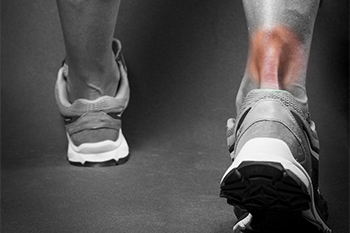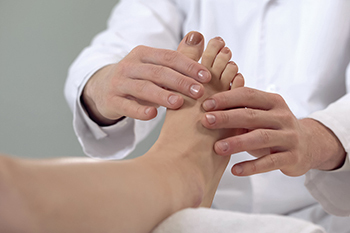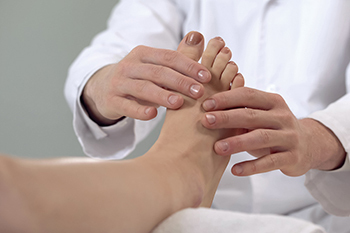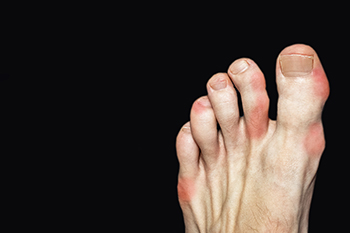

The Achilles tendon is found in the lower part of the calf, and it connects the heel to the calf muscles. This tendon can become easily injured, generally from increasing speed and mileage too quickly. When the tendon is stretched beyond its normal range of motion it may rupture completely or partially, which can cause considerable pain and discomfort. Patients who have this condition can find it difficult to walk, and prompt medical attention is often sought. Additionally, people can develop another type of Achilles tendon injury, which is referred to as Achilles tendinopathy. This is described as a chronic condition that can be a result of gradual wear and tear of the Achilles tendon. In both cases, relief may start with ceasing the activity that caused the injury. In severe cases, surgery may be necessary to repair the tendon. If you have an Achilles tendon injury, it is strongly suggested that you are under the care of a podiatrist who can guide you toward correct treatment techniques.
Achilles tendon injuries need immediate attention to avoid future complications. If you have any concerns, contact Dr. Edward D. Hutson of Easton, PA. . Our doctor can provide the care you need to keep you pain-free and on your feet.
What Is the Achilles Tendon?
The Achilles tendon is a tendon that connects the lower leg muscles and calf to the heel of the foot. It is the strongest tendon in the human body and is essential for making movement possible. Because this tendon is such an integral part of the body, any injuries to it can create immense difficulties and should immediately be presented to a doctor.
What Are the Symptoms of an Achilles Tendon Injury?
There are various types of injuries that can affect the Achilles tendon. The two most common injuries are Achilles tendinitis and ruptures of the tendon.
Achilles Tendinitis Symptoms
Rupture Symptoms
Treatment and Prevention
Achilles tendon injuries are diagnosed by a thorough physical evaluation, which can include an MRI. Treatment involves rest, physical therapy, and in some cases, surgery. However, various preventative measures can be taken to avoid these injuries, such as:
If you have any questions please feel free to contact our offices located in Easton, and Northampton, PA . We offer the newest diagnostic tools and technology to treat your foot and ankle needs.

Anyone who has experienced ankle pain is often aware of the difficulty this may cause while attempting to complete daily activities. The function of the ankle is to provide balance and stability to the body, and there are several bones, ligaments, and tendons that are found within it. Research has indicated it is the bone in the body that is injured most frequently, and it can happen from overuse, or a running injury. It can also occur while stepping off of a curb or uneven surface, which can stretch the ankle beyond its normal range of motion. It is suggested that people who enjoy participating in sporting activities perform strengthening ankle stretches and exercises, and this may help to provide proper conditioning. There may be existing medical conditions that can affect the ankle. These include osteoarthritis, rheumatoid arthritis, or post-traumatic arthritis. It may be difficult to put any weight on the ankle, and walking may be difficult or impossible to do. Ankle discomfort is not a normal ailment to have, and if you are experiencing this type of pain, it is strongly advised that you consult with a podiatrist who can determine what the source is, and treat it accordingly.
Ankle pain can be caused by a number of problems and may be potentially serious. If you have ankle pain, consult with Dr. Edward D. Hutson from Easton, PA. . Our doctor will assess your condition and provide you with quality foot and ankle treatment.
Ankle pain is any condition that causes pain in the ankle. Due to the fact that the ankle consists of tendons, muscles, bones, and ligaments, ankle pain can come from a number of different conditions.
Causes
The most common causes of ankle pain include:
Symptoms
Symptoms of ankle injury vary based upon the condition. Pain may include general pain and discomfort, swelling, aching, redness, bruising, burning or stabbing sensations, and/or loss of sensation.
Diagnosis
Due to the wide variety of potential causes of ankle pain, podiatrists will utilize a number of different methods to properly diagnose ankle pain. This can include asking for personal and family medical histories and of any recent injuries. Further diagnosis may include sensation tests, a physical examination, and potentially x-rays or other imaging tests.
Treatment
Just as the range of causes varies widely, so do treatments. Some more common treatments are rest, ice packs, keeping pressure off the foot, orthotics and braces, medication for inflammation and pain, and surgery.
If you have any questions, please feel free to contact our offices located in Easton, and Northampton, PA . We offer the newest diagnostic and treatment technologies for all your foot care needs.

Just as with adults, children’s foot care is important to their health and wellbeing. Children’s feet are more delicate, and they are still growing. Properly fitted shoes are vital. Children can also experience unique foot disorders, such as Sever’s disease, flatfoot, plantar warts, or other conditions or deformities. Most children with flat feet do not have pain, but sometimes this can cause difficulty in a child’s participation in sports, or they may walk or run awkwardly. It can cause pain or cramping in the feet, legs, or knees. Sever’s disease is an inflammation of the heel’s growth plate that usually affects kids between ages 8 and 14 because the heel bone is not yet fully developed. Plantar warts can develop on the feet, usually the soles, from the human papilloma virus (HPV). These warts can be deep in the skin and be painful when walking or standing. Should your child have a problem with their feet or they are experiencing foot pain, seek treatment from a podiatrist.
Making sure that your children maintain good foot health is very important as they grow. If you have any questions, contact Dr. Edward D. Hutson of Easton, PA. . Our doctor can provide the care you need to keep you pain-free and on your feet.
Keeping Children's Feet Healthy
Having healthy feet during childhood can help prevent medical problems later in life, namely in the back and legs. As children grow, their feet require different types of care. Here are some things to consider...
Although babies do not walk yet, it is still very important to take care of their feet.
Avoid putting tight shoes or socks on his or her feet.
Allow the baby to stretch and kick his or her feet to feel comfortable.
As a toddler, kids are now on the move and begin to develop differently. At this age, toddlers are getting a feel for walking, so don’t be alarmed if your toddler is unsteady or ‘walks funny’.
As your child gets older, it is important to teach them how to take care of their feet.
Show them proper hygiene to prevent infections such as fungus.
Be watchful for any pain or injury.
Have all injuries checked by a doctor as soon as possible.
Comfortable, protective shoes should always be worn, especially at play.
If you have any questions please feel free to contact our offices located in Easton, and Northampton, PA . We offer the newest diagnostic and treatment technologies for all your foot and ankle needs.

Gout is an inflammatory form of arthritis, and is considered to be the most common form of this painful condition. Gout generally affects the joints in the big toe, and is caused by excess uric acid in the blood, causing crystals to form. This can occur from genetic reasons, or from eating foods that have high purine levels. These types of foods can include red meat, shellfish, alcohol, and drinks that are made with large amounts of sugar. The pain that patients experience with gout can be debilitating, and it is often difficult to walk. A proper diagnosis can consist of having an X-ray taken, and fluid may be extracted out of the affected joints that houses the crystals. Patients who have existing medical issues may be at a higher risk for getting gout. These can include obesity, kidney disorders, high blood pressure, and diabetes. Living a healthy lifestyle may help to prevent future gout attacks, and may be easier to control if they do happen. If you have questions about gout, or have frequent attacks, it is strongly advised that you are under the care of a podiatrist who can answer any concerns you may have, and guide you toward proper treatment options.
Gout is a painful condition that can be treated. If you are seeking treatment, contact Dr. Edward D. Hutson from Easton, PA. . Our doctor will treat your foot and ankle needs.
What Is Gout?
Gout is a form of arthritis that is characterized by sudden, severe attacks of pain, redness, and tenderness in the joints. The condition usually affects the joint at the base of the big toe. A gout attack can occur at any random time, such as the middle of the night while you are asleep.
Symptoms
Risk Factors
Prior to visiting your podiatrist to receive treatment for gout, there are a few things you should do beforehand. If you have gout you should write down your symptoms--including when they started and how often you experience them, important medical information you may have, and any questions you may have. Writing down these three things will help your podiatrist in assessing your specific situation so that he or she may provide the best route of treatment for you.
If you have any questions, please feel free to contact our offices located in Easton, and Northampton, PA . We offer the newest diagnostic and treatment technologies for all your foot care needs.